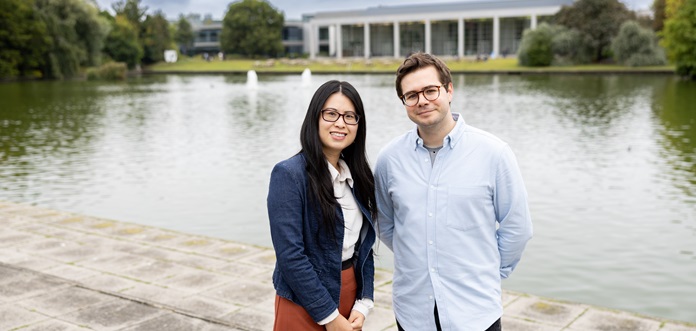Dr Junli Xu awarded European Research Council funding for microplastics research
Dr Junli Xu, Assistant Professor and Ad Astra Fellow at UCD School of Biosystems and Food Engineering and a UCD Conway Fellow has been awarded a prestigious European Research Council (ERC) Starting Grant. She will receive €1.5 million for her project ‘Machine Learning Combined with Spectral Imaging for Inferring the Toxicity of Micro- and Nanoplastics’ (Plastox).
Tiny plastic particles, known as micro- and nanoplastics (MNPs), are everywhere - in the air we breathe, the water we drink, and the food we eat. A recent international conference on Microplastics and Human Health at UCD highlighted that the levels of microplastics in the environment are around 100 times higher than the levels of other chemicals, and that a significant amount of research is still required to establish the exact toxic effects of microplastics on humans.
PlasTox will investigate how MNPs affect human digestive health. The outcomes of this research have the potential to yield breakthroughs in numerous key applications such as toxicological screening of drugs, safety assurance and environmental hazard monitoring, and to open up a whole new field of research in toxicology.
 Dr Junli Xu pictured with Dr David McManus on the announcement of ERC awards.
Dr Junli Xu pictured with Dr David McManus on the announcement of ERC awards.
Dr Xu, explained, “By using advanced techniques such as machine learning and spectral imaging, we will develop new models that can predict the health impacts of MNPs, potentially transforming how we assess the risks they pose and reducing the need for costly lab experiments. The significance of this work lies in its potential to revolutionise our approach to toxicology, environmental safety, and public health, by offering more accurate and efficient ways to assess the risks associated with MNP exposure.”
European Commissioner for Innovation, Research, Culture, Education and Youth, Iliana Ivanova, said, “The European Commission is proud to support the curiosity and passion of our early-career talent under our Horizon Europe programme. The new ERC Starting Grants winners aim to deepen our understanding of the world. Their creativity is vital to finding solutions to some of the most pressing societal challenges. In this call, I am happy to see one of the highest shares of female grantees to date, a trend that I hope will continue. Congratulations to all!”
President of the European Research Council, Professor Maria Leptin, said: “Empowering researchers early on in their careers is at the heart of the mission of the ERC. I am particularly pleased to welcome UK researchers back to the ERC. They have been sorely missed over the past years. With fifty grants awarded to researchers based in the UK, this influx is good for the research community overall.”
Dr Xu is one of two UCD researchers from a cohort of 494 young scholars to receive ERC funding totalling nearly €780 million. Dr David MacManus, Assistant Professor at UCD School of Mechanical and Materials Engineering, will receive €1.5 million for his project ‘Bridging the sex gap in traumatic brain injury biomechanics’ (brainsex). Seven projects in total will be hosted in Ireland. This scheme is part of the EU Horizon Europe programme and will support the scholars to launch cutting-edge research projects.
UCD Vice President for Research, Innovation and Impact, Professor Kate Robson Brown said, “Congratulations to Dr Xu and Dr MacManus on receiving coveted ERC grants. Their groundbreaking projects will contribute significantly to their respective fields. UCD is committed to supporting academic career development and ambitious projects at every career stage and we are excited to follow the progress of these promising researchers and their fascinating projects.”
On the announcement, Dr Xu said, “I am thrilled and deeply grateful to be awarded an ERC Starting Grant. PlasTox provides me with the opportunity to explore highly ambitious and innovative research ideas that are both transformative and impactful, expanding beyond microplastic research into other areas of toxicology. Attaining competencies in the microplastic domain involves environmental science, life science, analytical chemistry, mathematics and data analytics to make substantial progress and anchor this field of research as a standalone activity. The ERC Starting grant provides an optimal solution for such evolution, allowing for the acquisition of essential instruments and the expansion of my research team.”
“I sincerely thank my collaborators, colleagues, and team members for their support, with special gratitude to Professor Aoife Gowen for her mentorship and inspiration. I am also deeply grateful to the SFI-IRC Pathway Programme and the UCD Ad Astra Fellowship for their funding, which has enabled my research independence.” Brainsex
For further information and a full list of awardees visit the European Research Council website.
Prepared from materials written by Emma Loughney, UCD Research Communications Officer
Social Media Links